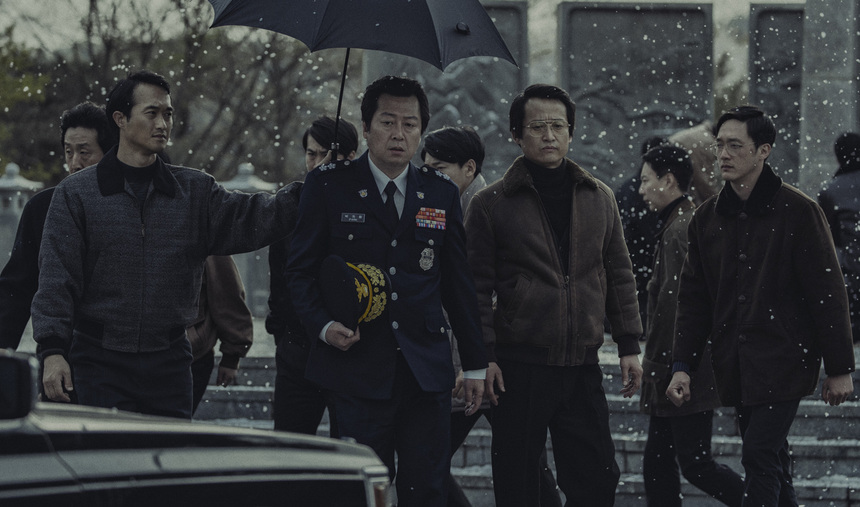Review: 1987: WHEN THE DAY COMES Offers Timely and Powerful History Lesson

Save the Green Planet director Jang Joon-hwan mobilizes dozens of familiar faces, including The Chaser and The Yellow Sea stars Kim Yun-seok and Ha Jung-woo, for a weighty and powerful dramatization of the birth of Korean democracy. Following a slew of other politically-minded films, the sprawling protest drama 1987: When the Day Comes caps off what has been a tumultuous year for Korea that began with millions on the streets and resulted in the scandalous downfall of a polarizing head of state.
In early 1987, student protester Park Jong-chul died as a result of excessive torture. In the months that followed, several people worked behind the scenes to keep the death under wraps while journalists, students and even rogue district attorneys and prison guards attempted to reveal the truth. His death served as a catalyst for the June Democratic Uprising which quickly changed the political landscape of the country.
Four months ago, A Taxi Driver, a drama about foreign journalist Jürgen Hinzpeter trying to report on the Gwangju Massacre in 1980, became the year's biggest hit. In many ways, 1987 picks up where that left off, as the protests that the murdered student had participated in were a continuation of the resistance against the dictatorial President Chun Doo-hwan that kicked off in Gwangju. A secret university group even shows the footage shot by Hinzpeter to try and convert fellow students to their cause.
Unlike most of Korea's big screen takes on the darkest days of its modern history, this one sidesteps planting any melodramatic foundations as it begins with the young student's still warm body lying on a concrete floor as doctors are brought in through a back entrance to try and resuscitate him. News travels up the chain of command and then across it when the cover-up begins, while a few crumbs get picked up by those just around the edges, which introduces us to a dizzying amount of characters in a short amount of time.
Yet even after a lengthy build-up through several layers of government, media and society, many of the film's key players have yet to be introduced. As 1987 moves into its midsection, the characters who will impact the film the most dramatically are slyly introduced while some administrative cogs fade into the background. The death of Park Jong-chul is a formative moment of Korean history that every local viewer will be intimately familiar with, so while the opening salvo ably fires up the dormant outrage that lies within the country's citizens, Jang and screenwriter Kim Kyung-chan wisely break away from a foregone conclusion to focus on dramatic elements that are eventually deployed in a cathartic finale.
Jang has a formidable cast at his disposal and remarkably, all of them, even those appearing in just a handful of scenes, are at the top of their game. Kim Yun-seok's interrogation chief sends chills every time he appears while Ha Jung-woo plays a charismatic (when isn't he?) DA in a role that's smaller but also far more effective than his guardian angel in the fantasy epic Along with the Gods: The Two Worlds, also out in late December.
Following A Taxi Driver, Yoo Hae-jin excels as an affable and conflicted prison guard, while The Handmaiden's breakout star Kim Tae-ri shows her mettle and charm once more as a young student caught up in the chaos. Several other standouts include Park Hee-soon (V.I.P.) as the grizzled interrogator responsible for the incident, Lee Hee-joon's (Worst Woman) determined journalist, Seol Kyung-gu's (Public Enemy) resistance figure in hiding and Gang Dong-won (The Priests) as another student protester.
From early on, the camera pours over the cast's eclectic faces from sharp and sometimes hidden vantage points as cinematographer Kim Woo-hyung gives the film an in-the-moment immediacy, while also peppering the film with some more thoroughly staged scenes, such as a thrilling and kaleidoscopically lit church-set cat-and-mouse sequence. It will be a treat to see what Kim brings to his next project, Park Chan-wook's upcoming BBC series The Little Drummer Girl. Meanwhile, sharp editing by Yang Jin-mo deftly weaves through the film's many overlapping narratives and points of view.
While Hollywood can look to Steven Spielberg's timely investigative reporting drama The Post this winter, Korea will be taking a very close look at 1987: When the Day Comes. A Taxi Driver, as well as films before it such as The Attorney, may have opened the door, but Jang's grand, kinetic and poignant third film is the first to reach all the way in and pull back out the dirty past for viewers to face head on.







